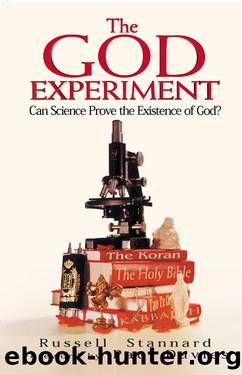The God Experiment: Can Science Prove the Existence of God? by Russell Stannard

Author:Russell Stannard
Language: eng
Format: mobi, epub
Tags: REL051000 Religion / Philosophy
ISBN: 9781616436568
Publisher: Hidden Spring
Published: 2000-10-31T16:00:00+00:00
THE CAUSE OF THE BIG BANG?
That being the case, it seems only reasonable to ask what caused the Big Bang.
The religious response is to say that God created the world. But, as indicated at the opening of this chapter, that is not the only possibility. There are those who argue that the world might have created itself â spontaneously. For this to have happened, two problems must be addressed:
(i) How to get something for nothing. This is not as difficult as one might at first think. Let me explain.
On looking at the world, we see many properties â electric charge, for example. We have seen how atoms are made of protons, neutrons, and electrons, and how every proton has positive electric charge and every electron negative electric charge. There is clearly an enormous amount of electric charge in the world. But there is no difficulty creating electric charge. In the kind of experiments I used to do at CERN (Europeâs main laboratory for particle physics) in Geneva with the big particle accelerator there, electrically charged particles are created all the time. The trick is not to try and produce the particles one at a time; instead several are produced together. That way the newly created positive electric charge on certain of the particles can be balanced by an equal amount of new negative electric charge on the others. Thus, there is no net increase in charge.
This being so, when we look at the Universe, the question we ought to be asking is not so much âHow much charge is there in the Universe?â as âHow much net charge is there?â It is then one discovers that the answer â very, very precisely â is zero. There is no net charge in the Universe.
Take another property: momentum. This is a property possessed of moving objects and crudely speaking is a measure of the ability of the object to barge other things out of its way. As such, the momentum of the object depends upon the speed at which it is traveling, and how heavy it is. Again there is no difficulty in creating momentum. Get out of your chair and start walking, and you possess momentum that you did not have when seated. This was gained by pushing with your feet against the floor. This action sent the Earth recoiling in the opposite sense with an equal and opposite momentum (not that one notices this, of course; the Earth being so much heavier than you, it does not need to acquire much speed to match your momentum). Again there has been no net change in momentum.
When we look at the cosmos, clearly there is a great deal of momentum out there â planets orbiting their stars, the stars orbiting the center of their swirling galaxy, the motion of the galaxies within their clusters, and the recessional speeds of the clusters themselves. But note that there is as much movement in one direction as in the opposite sense, so the net amount is again zero.
Download
The God Experiment: Can Science Prove the Existence of God? by Russell Stannard.epub
This site does not store any files on its server. We only index and link to content provided by other sites. Please contact the content providers to delete copyright contents if any and email us, we'll remove relevant links or contents immediately.
The Lost Art of Listening by Michael P. Nichols(6465)
Why I Am Not A Calvinist by Dr. Peter S. Ruckman(3767)
The Rosicrucians by Christopher McIntosh(3047)
Wicca: a guide for the solitary practitioner by Scott Cunningham(2703)
Signature in the Cell: DNA and the Evidence for Intelligent Design by Stephen C. Meyer(2497)
Real Sex by Lauren F. Winner(2467)
The Holy Spirit by Billy Graham(2409)
To Light a Sacred Flame by Silver RavenWolf(2351)
The End of Faith by Sam Harris(2282)
The Gnostic Gospels by Pagels Elaine(2023)
Nine Parts of Desire by Geraldine Brooks(2002)
Waking Up by Sam Harris(1954)
Heavens on Earth by Michael Shermer(1951)
Devil, The by Almond Philip C(1897)
Jesus by Paul Johnson(1882)
The God delusion by Richard Dawkins(1843)
Kundalini by Gopi Krishna(1822)
Chosen by God by R. C. Sproul(1755)
The Nature of Consciousness by Rupert Spira(1688)
